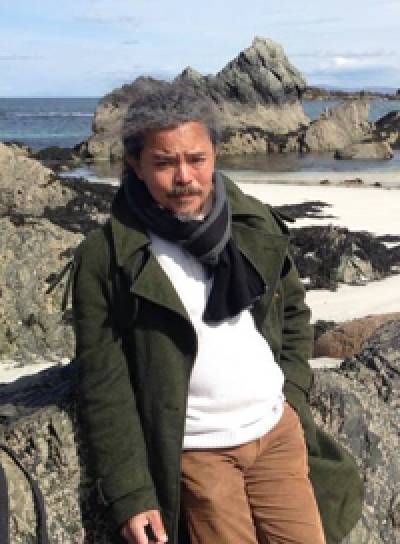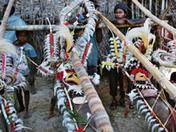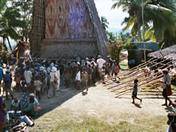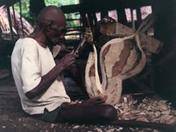 | Tel: +44 (0)20 7679 8642 Fax: +44 (0)20 7679 8632 E-mail: l.coupaye@ucl.ac.uk Room: 141
|
Main Interests
- Anthropology of Art (Pacific, general)
- Anthropology of Techniques (Skills, Body, Design, Materials)
- Anthropology of Technology (STS, ANT, Politics, Digital, Politics)
- Papua New Guinea, Sepik, Oceania
- Museum ethnography (Collections, Display, Scenography, Exhibitions)
General Interests
Areas: Melanesia, Polynesia, Australia, Africa (Mali, Madagascar)
Topics: Techniques, exchanges, ethnobotany, rituals, magic, food, aesthetics, materials, environment, museum display and scenography, innovation, methodology, history of theories, technology, technocracy, digital.
Approaches: Archaeology and Ethno-archaeology, Art History, Science and Technology Studies, Actor-Network Theory, Politics and Ontology, Frankfurt School, Non-Linear Theory, Praxeology, Ergonomy, Cognition.
Past and Present Research
My research follows and combines different strands of research, distributed over four interrelated topics: material and visual culture in Oceania; Art and Aesthetics among the Abelam; Anthropology of Techniques, Skills and Materiality; Anthropology of Technology and Modernity. I am also one of the two academic curators (with Dr. Haidy Geismar) of the UCL Ethnographic collections and contribute regularly to its documentation.
Strand 1: Original Fieldwork and Research: Papua New Guinea and the Pacific
I did my research in the Sepik area of Papua New Guinea, among the Abulës-speakers (Abelam), the same communities Phyllis Kaberry and Anthony Forge did their own fieldworks. My doctoral field research (2001-2003) followed closely the cultivation and display of the long yams (tubers) in Maprik area, combining the method of the Francophone anthropology of techniques (Leroi-Gourhan, Lemonnier) with Anglophone material culture studies, as well as archaeological and ethno-archaeological approaches.
This research led to the publication of his 2013 book Growing Artefacts, Displaying Relationships: Yams, Art and Technology amongst the Abelam of Papua New Guinea (Berghahn Books). Through the combination of anthropology of material culture, anthropology of art and anthropology of techniques, the book describes the process of making, decorating and displaying these long yams, and shows how this process merge agricultural techniques, social interactions, and cosmological knowledge. In the course of the book, after discussing the debated positions of techniques and arts within anthropological studies, I also addressed some theoretical issues on materiality, agency of art, technology and determinism, as well as on exchanges, rituals and aesthetics.
This approach has been fed by his several years of teaching the anthropology of Pacific arts, investigating the multi-layered relation between people and things through the ways Pacific societies create their material culture.
Strand 2: Anthropology of Art and Indigenous Representational Systems: The Abelam case and beyond.
This strand prolongs the works of Anthony Forge and his early investigation of Abelam modes of representations, which have inspired Alfred Gell's discussion of enchantment and agency (1992, 1998).
I explore the pragmatic role of images and image-making not only in the Maprik area but also in other areas of the Pacific. Particularly interested in the concept of "semiotic ideologies" put forward by Webb Keane (2001), I re-engage with the question of indigenous aesthetics (Morphy), through a careful investigation of iconography as well as the processes of image-making.
I have recently directed my attention to a Peircean approach to Pacific visual culture, to push further some theoretical suggestions put forward by Gell. I have been investigating the relation between the making of images, "ontological regimes" and vernacular forms of sociology, in order to bring together elements form the New Melanesian Ethnography (Marilyn Strathern, Roy Wagner), cognition (Edwin Hutchins), semiotic theories (Webb Keane) and classical anthropology of art (Forge, Howard Morphy, Michael O'Hanlon, Christian Kaufmann).
Strand 3: Anthropology of Techniques: Gestures, Skills, Logic and Actions (ANTH3055/ANTHGC10)
My third major research area is the investigation of techniques, material activities, and intersect with discussions about design, practice and making. I have attempted to rethink the methodological tool of the chaîne opératoire (Operational Sequence, André Leroi-Gourhan, Pierre Lemonnier) as a heuristic device aiming at documenting the ontological heterogeneity of processes of making and the relational nature of material activities as well as their ontogenetic properties (Gilbert Simondon). The notion of scale plays a crucial part in this trend, as I aim at bridging the gap between the level of gestures (Leroi-Gourhan, François Sigaut, Tim Ingold) and the wider scale of political economy and cosmologies (Bruno Latour, Philippe Descola).
Building on my teaching in the Course on Anthropological Perspectives on Techniques and Technology, I am particularly interested in vernacular theories of action and "efficacy", and how chosen gestures, actions and operations reveal the ways properties of things and materials engaged with are imagined. This is allow me to move to the level of network, not anymore as flat ontologies, but as a specific instantiations of a path, or trajectories, through different collectives of humans and non-humans, where politics and imaginations play a crucial role.
I am currently engaging with the work of Simondon on "ontogenesis" to investigate a way to bridge the gaps between Anthropology of Ontology and Political Anthropology (see next strand).
As part of this trend, and related to the next one on "Technology", I also collaborate with Perig Pitrou, from the Laboratoire d'Anthropologie Sociale and the Collège de France on the relationship between artefacts and living beings, through an examination of the imbrication of technical processes and vital processes. This has led to one workshop focusing on Oceania, and a major international conference in 2015 at the musée du quai Branly https://actesbranly.revues.org/647.
Strand 4: Anthropology of Technology: Political and Ontological Meta-Category (ANTH3055/ANTHGC10)
My fourth and most recent strand deals with the wider question of the relationship between "technology" and "society". While this is a classical topic in anthropology, my focus starts at the epistemological level and I approach "technology" as a dominant meta-category used not only in the public domain (media, politics, and industry) , but also in academia (e.g. Michel Foucault's technology of the self, Alfred Gell's technology of enchantment).
As a prolongation from my interest in the anthropology of techniques, I am aiming at doing for "technology" what anthropology has done with other meta-categories such as "Nature" or "Society". This means seeking to reveal its hidden metaphysical assumptions and their effect on discourses, analyses and choices on current issues such as innovations, politics, development, environment or well-being. Combining studies from STS, SCOTs, ANT, Philosophy, ethnography and Critical Theory, this strand leads to thinking through the materialisation of renewed forms of technocracy, through new logics, new devices, their conception, their mode of existence and functioning and their use.
As such, this trend thus also is in gear with recent developments in Digital Anthropology and Humanities, through an examination of the role of digital devices in the ontogenesis of capitalism, new Modernist logics and master narratives using a combination of authors and thinkers such as Lewis Mumford, Gilbert Simondon, Andrew Feenberg, Tim Ingold, and Bruno Latour.
Working on the design of a fieldwork methodology which would go beyond the analysis of discourse, I am currently investigating ways to empirically tackle the question of new forms of technocracy manifested through and enabled by the increased role of the digital world in everyday life. This might imply an ethnography of machines and the demonstration of how narratives and ideologies of determinisms, efficiency and other productivist conceptions are built in the very material core of contemporary devices (processors, algorithms…) and realised through their ways of functioning (automation, AI, augmented reality…).
Selected Talks and Publications
- (Forthcoming) "Realising Fantasies, Unveiling Creations: Objects as Contexts, Processes and Presence" In Object Fantaisies Conference, edited by Philippe Cordez. Berling: De Gruyter.
- (Forthcoming) "The Problem of Agency in Art", in a Collection of papers by Anthony Forge, edited by Nicholas Thomas.
- 2016: "Yams as vernacular methodology? Approaching vital process through technical processes", in Proceedings of the colloquium Des êtres vivants et des artefacts. L'imbrication des processus vitaux et des processus techniques, P. Pitrou, L. Coupaye, F. Provost (eds). Online http://actesbranly.revues.org/647.
- 2016, May: "From the Anthropology of Technics to the Anthropology of Technology: Theories, Methods and Questions". Paper presented at the seminar Anthropological Approaches to Technics, at Institute for Science, Innovation and Society, Oxford, UK.
- 2015: "Chaîne Opératoire, Transects et Théories : quelques réflexions et suggestions sur le parcours d'une méthode classique". In André Leroi-Gourhan « l'homme tout simplement », edited by Philippe Soulier. Paris: Éditions de Boccard - Travaux de la MAE - Maison de l'Archéologie et de l'Ethnologie, René-Ginouvès.
- 2015. "Unleashing the Chaîne Opératoire: Students' experimentations with an old methodology". Material World Blog
- 2015, November: "Technology as a meta-category". Paper presented at the workshop Metacategories at the Center for Advanced Study in the Behavioral Sciences (CASBS), organised by Howard Morphy, Stanford, California.
- 2015, June: "De l'anthropologie des techniques à l'anthropologie de la Technologie". Paper presented at the International Workshop: Technology Between Europe and the United States : (19th-20th century): Meeting and Ignoring One Another organised by G. Carnino, EHESS, Paris, France.
- 2015, June: "Matters of Relations: Kurabu & Kutapmu: Ceremonial Houses and Yam Mounds in Nyamikum village (East Sepik Province, PNG)." Paper presented at the panel Matière(s) à relations : analyses contemporaines des rituels océaniens (org. P. Bonnemère & S. Revolon) at the European Society for Oceanists, Brussel, Belgium.
- 2015, February: "From the Etic to the Emic: Chaînes opératoires as Transects through Categories". Keynote paper presented at the Workshop Technical transformations from local perspectives, organised by Dr. Carlos Sautchuk, Laboratório de Antropologia da Ciência e da Técnica (CNPq), Departamento de Antropologia, Programa de Pós-Graduação em Antropologia Social, Universidade de Brasília. Brasília, Brazil.
- 2015, December: "Transecting Ontological Claims: Chaînes Opératoires and the mapping of Materialities". Paper presented at the Fondation Fyssen Seminar on Social and Cognitive Dimensions of technological Change |(org. C. Knapett), Paris.
- 2014, February: "Entre Celui-Qui-Voit et Celui-Qui-Dévore : Le jardin comme espace de transformation cosmologique en Mélanésie (Nyamikum Abelam,Papouasie-Nouvelle-Guinée) ". Seminar Approches Anthropologiques du Paysage (org. by P. Descola, Collège de France), Paris.
- 2013: Growing Artefacts, Displaying Relationships: Yams, Art and Technology amongst the Nyamikum Abelam of Papua New Guinea. Oxford & New York: Berghahn Books.
- 2013, October: Wenner-Gren Foundation Workshop Grant Epistemologies of Technology and Techniques UCL, 24th -26th of October 2013.
- 2012. "De « l'objet social total » à la « sociologie par l'objet ». L'igname comme contexte chez les Abelam de Papouasie-Nouvelle-Guinée". In Actes du Colloque La Préhistoire des Autres, edited by Anne-Christine Taylor & Nathan Schlanger. Paris: La Découverte-INRAP: 351-367.
- 2010 (with Laurence Douny). "Dans la trajectoire des choses: comparaison des approches francophones et anglophones contemporaines en anthropologie des techniques." Techniques & Culture 52-53: "Technologies", edited by Ludovic Coupaye and Laurence Douny: 12-39: https://tc.revues.org/4956
Teaching
Ludovic Coupaye has taught or teaches at undergraduate and postgraduate levels the following courses:
At UCL:
- (since 2014): Core Course in Digital Anthropology (ANTHGM01, Contributor): : Locating the anthropology of "Technology" within Digital Anthropology?
- (since 2011): Research Methods (ANTHMETH, Contributor): Fieldnotes and Fieldworkers.
- (since 2011): Course designer and convenor of Anthropological perspectives on techniques and technologies (ANTH3055 and ANTHGC10).
- (since 2011): Introduction to Material Culture (ANTH1001, contributor): lectures on museums, contact zone, techniques and technology.
- (since 2010): Core course on Material, Visual and Digital Culture (ANTHGC01, Contributor): Course on Techniques, Visual Culture and Ontologies.
- (since 2013): Coordinator for the Individual Studies Course (ANTH3048), Final year dissertation.
- 2012-2013: Course convenor for the Thesis Writing Seminar (ANTHTWS)
- 2010-2013: Collections Management and Care
- 2010-2011: Course convenor for the course on Research Design and Presentation
- 2010-2011: Anthropology of Arts & Design, (ANTH7004)
In France:
Ongoing since 2007: Course convenor of "History and Anthropology of the Arts of Oceania" (UG) École du Louvre, Paris, France
PhD Supervised
- Emily Brennan (1st) (Due in 2017): Barkcloth in Kew Garden and Indonesia
- Jack Davy (1st) Due in 2017: Miniaturisation: A study of a material culture practice among the indigenous peoples of the Pacific Northwest
- Nadia Elmrabet (1st): Due in 2017: Black boxes: technology, digital literacy and social change in Panama.
- Rosalie Allain (1st): Due in 2019: Minerals-in-Motion: A study of resource making and value transformations in the Congo
Other Affiliations
Research Associate to the Centre de Recherche et de Documentation sur l'Océanie (CREDO, UMR 6574, Université de Provence) in Marseille, France, and to the Sainsbury Research Unit, at UEA, Norwich.
Member of the research team Anthropologie de la vie et des représentations du vivant Laboratoire d'anthropologie sociale (UMR7130) - Responsables : Dimitri Karadimas, CNRS, Laboratoire d'anthropologie sociale ; Perig Pitrou, CNRS, Laboratoire d'anthropologie sociale.
Member of the editorial board of Editorial board for:
- Techniques & Culture: http://tc.revues.org/?lang=en
- Journal of Material Culture http://mcu.sagepub.com/content/current
 Close
Close




